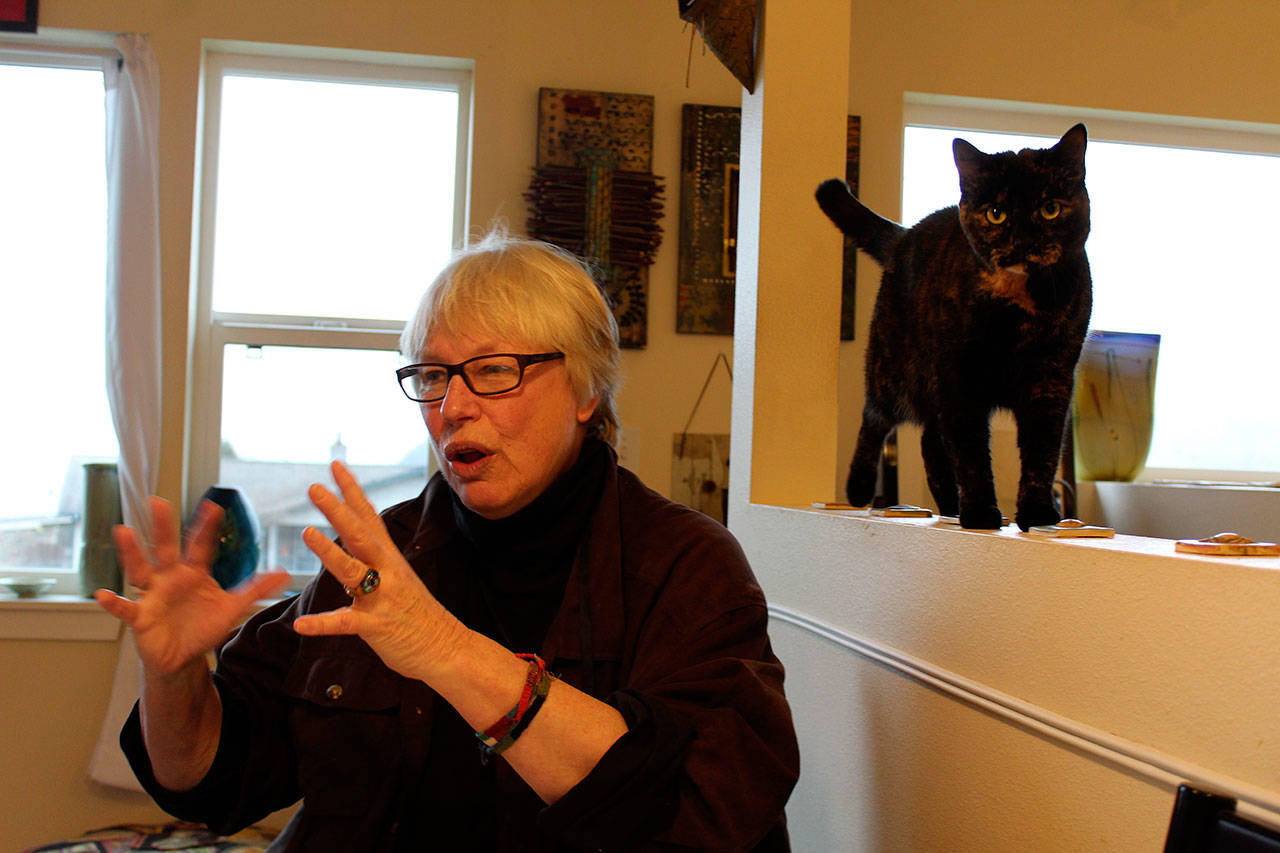Portraits of pets are the usual purview for Susan Jensen, known on Whidbey Island for her cute caricatures of furry and feathered friends.
But when she writes, her tone is anything but light.
Jensen decided to take on the topics of alcoholism and global warming in a kid-friendly manner, publishing two children’s books last year.
The books are self-published, sold locally and on Amazon.
“My Dad Smells Funny” is written from the perspective of a young girl trying to understand why her dad’s hands shake, why he doesn’t smell like other dads, why he misses so many days of work.
“He smells like rotten fruit in the garbage,” Jensen said. “She learns her dad has a disease, and she learns to live her life despite her parent’s problems.”
Jensen said she wrote most of that book 30 years ago but recently updated it.
The creative flash for her illustrated book, “Island Solstice,” came more recently as winter’s dark days approached. In one of those “in the zone” moments artists experience but can’t explain, a woeful tale of a watery world emerged.
Set to the cadence of “‘Twas the Night Before Christmas,” the story tells how sea creatures rejoice because “the earth will be ours/the sea will be vast/and man will be gone/ from our lives at last.” One drawing shows a gray whale circling Seattle’s Space Needle that’s sunk into Puget Sound.
Not the usual fluffy fodder for young readers, Jensen admits. But she wants it to be a jumping-off point for discussions about the environment, climate change and conservation.
“As far as I can tell, there’s nothing about global warming for kids,” said Jensen, mother of two adult daughters to whom she dedicates the book, along with “the future of our planet.”
“I didn’t want it to be scary but you can teach children about sea creatures and the future of the earth. It starts that conversation,” she said. “The parents can guide the discussion.”
Set on the evening of solstice, Jensen’s simple quirky pastel drawings show a parade of all sea creatures great and small gathering to listen to Poseidon.
“Now sand soles and limpets/dog winkles and mussels/Oh, sea stars and scallops/And shipworms and oysters/Great fish of the sea/Sharks, halibut, rays/Now gather round, listen/To news of great days!”
Jensen admits “the poem is not a great poem.”
But she’s used to criticism.
“I was told what I do is not art by an artist, and that was crushing,” Jensen recalled. “What she meant is ‘fine art’ like Norman Rockwell’s is not ‘fine art’, so I thought, ‘Well, I’m in good company.’
“My stuff lends itself to kids so I figured why not write a children’s book?”
Jensen’s hoping the “Island Solstice” book and drawings will appeal to Western Washington University organizers of the April 4-6 Salish Sea Ecosystem Conference in Seattle.
“Island Solstice” costs $10 and 10 percent of sales go toward GreenPeace.
Jensen taught high school English, speech, drama and journalism for 12 years and worked more than two dozen years in Seattle media relations jobs. She moved to Cultus Bay in 2006.
Active in many writers groups, Jensen said she set out to write the Great American Novel years ago and a love story involving childhood sexual abuse came out. She named it “Cold Snap: A love story that spans a half century.”
Set in an Iowa college, the main characters of “Cold Snap” are unaware of how the secrets of the abuse they’ve suffered will push them together and pull them apart for 50 years.
Jensen, a graduate of the University of Iowa, said the topic hits close to home.
“They say, ‘write what you know and embellish the hell out of it.’”
She never actively promoted the self-published book, “Cold Snap,” but Jensen says she may be ready to do so now.
“In my case, I was confusing love with abuse. I think I’m ready to talk about it,” she says. “If abuse isn’t discussed, it’s the secrets that make us sick.”
For years, Jensen cobbled together jobs while raising two daughters. She continues the juggling act today. She converted her downstairs into a weekend retreat for airbnb guests. She refers to the $75 pet caricatures as her “bread and butter.”
Jensen, 74, also sells custom pastel landscapes from photographs people send her.
A self-described “happy spirit on a creative rampage,” much of Jensen’s energy and activity stems from an unexpected gift — time.
“I never thought I was going to live this long,” she says. “My mother died at age 62. I never imagined being able to “just write and paint and putter.”
For more information: www.susanjensenwhidbeyislandpastelartist.blogspot.com


